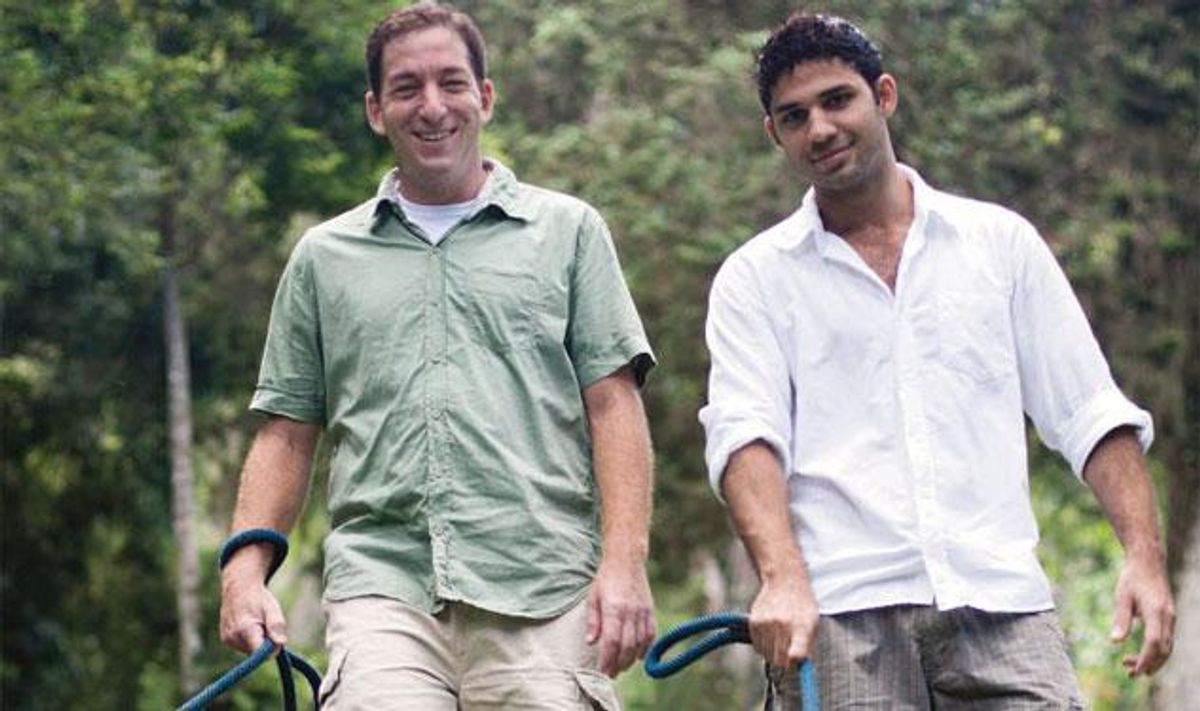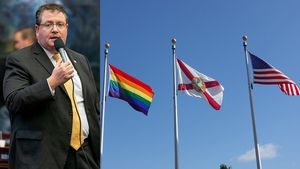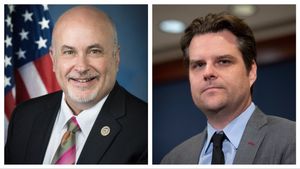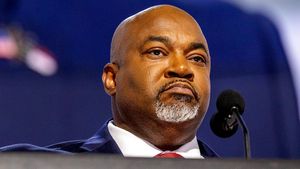This story originally appeared in the May 2011 issue of Out magazine.
With his conservative suits, white shirts, and narrow ties, Glenn Greenwald looks more like a Mormon missionary than a political commentator who can bring opponents to their knees -- and then get in a good kick while they're down. In one memorable TV appearance, he reveled in an on-air shouting match with Lawrence O'Donnell (the Senate staffer and West Wing producer turned pundit) over what had caused the Democrats to bungle the midterm elections. O'Donnell seemed to blame progressives; Greenwald made a strong case that it was the Blue Dog Democrats -- timid, Republican-imitating centrists -- who had doomed the party. On air, Greenwald called O'Donnell's contentions "absurd," but that wasn't enough. Over the next few days, on his popular Salon blog, he attacked both O'Donnell's demeanor ("adolescent") and substance ("trite," "superficial," and "empirically false").
And yet, since O'Donnell's show on MSNBC moved to a prime spot, Greenwald has been one of his most frequent guests. Perhaps it's because he can speak authoritatively on almost any subject, and with such sincerity that it's hard not to forgive his excess. Picture Watson, IBM's Jeopardy-winning supercomputer, as a political commentator, and you picture Greenwald: laden with an endless supply of facts and astonishing recall, yet blissfully unaware of the rules of the game.
Like Watson, Greenwald, 44, seems hardwired to best his opponents. Just six years after he wrote his first blog entry, he is consistently listed among the most influential pundits in the country (by mainstream media outlets like Forbes, The Atlantic, and New York). And, as a sign of his audience's loyalty, two of his three books -- supplements to the thousands of words he produces for Salon each day -- have become New York Times best-sellers. (The fourth, With Liberty and Justice for Some: How the Law Is Used to Destroy Equality and Protect the Powerful, will be out in October.)
Given Greenwald's intellectual fecundity and argumentative ferocity, being gay may be the least interesting thing about him. But even Greenwald doesn't claim that his sexual orientation doesn't matter. After all, if he were straight he would be living in Manhattan, his home for most of the last 20 years. Instead, he lives in Rio de Janeiro, barred from moving to the United States with his Brazilian boyfriend, David Michael Miranda.
"Brazil recognizes our relationship for immigration purposes, while the government of my supposedly 'free,' liberty-loving country enacted a law explicitly barring such recognition," says Greenwald, referring to the Defense of Marriage Act with the disdain he typically shows for policies he believes are eroding Americans' freedoms. Greenwald's attacks on the powerful make him a tempting target for reprisals. So it's no surprise that, soon after he started blogging, critics sometimes tried to out him in a game of "gotcha." But what upset Greenwald was the implication that he had been closeted in the first place. "There was nothing to out," he says. "I've been as out as I can be since I was 20."
In Rio, Greenwald and Miranda rent a house in the Gavea neighborhood, where, he says, he resents having to wear anything more formal than shorts and T-shirts. He also likes the fact that, in his far-below-the-Beltway existence, "My network of friends and associates are not media and political figures," which lets him resist the practice -- for which he skewers other journalists -- of currying favor with sources.
The downside to living in Brazil is that he has to decline frequent offers to appear on U.S. television. Instead, he makes half a dozen trips a year to New York City, during which he swaps the shorts for the Mormon missionary attire -- and squeezes in as many TV spots as possible, with side trips to speak at universities and pick up the journalism awards he's collecting just six years into the profession.
On his blog and in his books, Greenwald focuses on America's three overreactions to 9/11: the war in Iraq, the war in Afghanistan, and the war against personal liberty in the United States. There, he says Obama has been a disaster -- not only exerting powers Bush never claimed (including the right to assassinate a U.S. citizen who hasn't been charged with a crime) but also giving "liberal" cover to policies that were considered Republican aberrations when Bush was in the White House. Obama, Greenwald says, "has converted what had been seen as divisive, radical right-wing assaults into bipartisan consensus." If you think that's too strong a statement, you're probably not a regular reader of Greenwald's blog, where he marshals mountains of evidence and rigorous logic -- to make his left-of-center views seem like indisputable truths.
On the subject of why the United States is the target of terror attacks, Greenwald mocks commentators who pose the question with faux naivety. "Isn't Muslim culture just so bizarre, primitive, and inscrutable?" he asks. "As strange as it is, they actually seem to dislike it when foreign militaries bomb, invade, and occupy their countries and kill hundreds of thousands of Muslim children."
Greenwald is a fan of Julian Assange, the embattled founder of WikiLeaks, and Bradley Manning, the 23-year-old army intelligence analyst who last year sent thousands of classified Iraq war documents to WikiLeaks. Ratted out to military authorities by Adrian Lamo, a publicity-seeking blogger, Manning is now in a military prison, awaiting trial. Manning is gay, which may have led him to Lamo, who is active in the LGBT community, and possibly caused him to let his guard down during online chats with Lamo. And it has also enabled critics to depict him as unstable -- a typical antiwhistleblower technique. In fact, Greenwald says of Manning, "When he talks about his motivations, he's extremely politically insightful, astute, and thoughtful."
Greenwald believes Manning might have been less likely to reveal government secrets if he were straight: Gay people, because they're already "outside the sphere of comfort," have a "huge advantage in being willing to challenge authority," he says, speaking from experience.
Greenwald's first exposure to activism was at the side of his grandfather, who ran for city council in a Fort Lauderdale suburb as the rebel candidate, accusing everyone else of corruption. "It got nasty and personal," he recalls. At 18, Greenwald himself ran for the city council, but lost. In college, he became a keen debater.
In 1992, the Colorado legislature, in the infamous Amendment 2, barred local governments from treating gays and lesbians as a protected group. Greenwald, then a second-year student at NYU Law School, demanded that the faculty ban Colorado law firms from conducting job interviews on campus. Given the importance of interviews to budding lawyers, some activists were worried about a backlash. "There was this fear that it was going to turn the entire law school against lesbian and gay students," he says. "But Greenwald pressed on, motivated not just by the possibility of victory (the faculty eventually voted for the ban), but by the chance to make his purported allies put up or shut up -- as he says, "take a stand in defense of the principles they claimed to believe in or expose themselves as hypocrites."
By the third year of law school, he was working for a large law firm. But realizing that representing Goldman Sachs would have destroyed him psychologically, he set up his own firm, which represented several neo-Nazis and other unpopular clients.
When he and his former boyfriend, Werner Achatz, an Austrian-born lawyer, tried to lease an apartment, they were told they couldn't aggregate their incomes. "They said they only do that for married couples," Greenwald recalls. "We said we were a married couple." When that didn't fly, Greenwald became his own lawyer, suing the landlord for sexual orientation and marital status discrimination.
By 2004 he had tired of litigating, and was also at the end of an 11-year relationship with Achatz. He rented an apartment in Rio de Janeiro, expecting to remain there for two months. Emotionally drained, he says, "The last thing I was looking for was another relationship. Especially in Rio." But on his first day on the beach, he met Miranda.
The couple soon moved in together, adopted a series of stray dogs ("I'm almost a member of the pack of dogs," he says). To build a career from his new base in Brazil, Greenwald switched from law to journalism. (In 2007, his blog, called Unclaimed Territory, became part of Salon.) The "only gringo" in the Gavea neighborhood, Greenwald says he is now 100% fluent in Portuguese, and he has even begun making appearances on Brazilian TV. Miranda has learned English (and is now studying advertising and communications at the Escola Superior de Propaganda e Marketing), but even so, he says, there's no way he can read everything Greenwald produces. "Are you kidding?" Miranda asks. "He's a fucking machine."
Brazil, which was a military dictatorship until 1985 and has the largest Catholic population in the world, just approved same-sex marriage, and has long offered same-sex couples privileges that aren't available in the United States. That, Greenwald says, is a sign of how far the U.S. has fallen in its embrace of human rights. Greenwald occasionally writes about the unconstitutionality (not to mention inhumanity) of the Defense of Marriage Act, although not as often as some gay readers might like. But when he does take on the cause close to his heart, it isn't, he insists, special pleading. "Gay issues are about the same fundamental issues as other civil liberties questions -- the rights of the individual," he says. "If you think of gay issues as being discrete and separate, you're doing the cause a disservice."
In his early days as a blogger, Greenwald supported Democratic candidates who shared his pro-civil liberties views. But events in recent years -- in both the White House and Congress -- have changed his mind. "I just don't think meaningful change is possible through piecemeal reforms in either of the two political parties," he says. As for the Democrats themselves, he can barely contain his disgust. "The Republicans," he says, "have long lived by what they call the Buckley Rule: always support the furthest-right candidate who can plausibly win. That's because they believe conservatism will work and want to advocate for it. Democrats [by contrast] prop up the most centrist or conservative candidates -- i.e., corporatists -- on the ground that it's always better, more politically astute, to move to the right."
One of his hopes for 2012 is that candidates will emerge to take on the red and the blue teams -- he is keeping an eye on Gary Johnson, a two-term Republican governor of New Mexico, who is pro-gay and antiwar, and who could run with a Democrat like former Wisconsin senator Russ Feingold. He would also be happy to see a billionaire run without the help of either party, to disrupt the two-party stranglehold.
Greenwald believes the same manipulation of the two-party system is essential in the fight for gay rights. He says he is encouraged by the rise of the Log Cabin Republicans not because he likes a thing the GOP endorses, but because "it sends a signal to Democrats that they can't keep using gay voters as an ATM machine."
"I think gay voters have been too gullible," he says of their unwavering support for politicians who fail to keep promises. Being predictable, he says, offering advice to the gay community and an unwitting summary of his career, "is the best way to guarantee you're ignored."
How They Met
Greenwald: I was drinking a guarana tea on Ipanema beach; he was playing beach volleyball. His towel was near mine, and we started talking. I was 38; he was 19. I was established in my career; he was poor. I grew up in a South Florida suburb; he grew up an orphan in a Rio de Janeiro slum. So I was sure, especially in the beginning, that everyone assumed it was the classic midlife crisis type of relationship. But our love kept growing, and that made any concerns about what other people thought irrelevant.
Over time, we learned to turn the age difference into an asset, something that keeps our relationship vibrant and mutually stimulating. He prevents me from getting old, cranky, set in my ways, stagnant, and unspontaneous, and I keep him focused on career, future, responsibilities, and avoiding at least some of the bad mistakes of youth. It translates into this: I end up playing video games with a bunch of 23-year-olds until 3 a.m., and he ends up reading the Nietzsche I give him. Being young and from Rio, he's still way ahead of me in the hedonism department. But I've been learning to give up control and be more spontaneous something you can only do if you have absolute trust in the other person.
Miranda: I was playing volleyball with friends, and he was reading on the beach, and the ball almost hit him. I apologized, and from then on I was looking at him and he was looking at me. We talked after the game. I didn't speak much English, and he only knew a few words of Portugese, but we communicated everything important. When you meet the right person, you know it, and we knew it in that moment.
I think it took one week until we moved in together. I had dated men before Glenn, but not many; I'm a guy who likes to settle down. We've been together five and a half years. I used to go everywhere with him, but now that I'm studying, I sometimes have to stay in Rio when he travels. That makes me uncomfortable. He exposes himself to so much hate, and there are a lot of crazy people in the world. He has to do what he has to do. But when he travels without me, something's not right for me. I hope we will have children. I never knew my father, and my mother died when I was 5, but I was always around my cousins' kids. Kids bring so much joy to life, and I want Glenn to have that experience, too. I think he's going to be a great father.


















































































Sexy MAGA: Viral post saying Republicans 'have two daddies now' gets a rise from the right